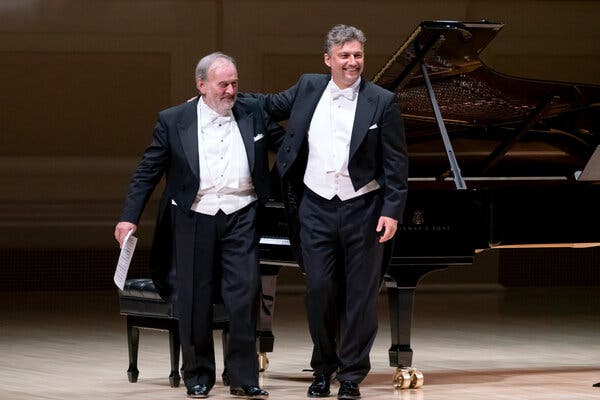 United States Various: Jonas Kaufmann (tenor) and Helmut Deutsch (piano) Presented by Cal Performances, Zellerbach Hall, University of California, Berkeley, 24.10.2021. (HS)
United States Various: Jonas Kaufmann (tenor) and Helmut Deutsch (piano) Presented by Cal Performances, Zellerbach Hall, University of California, Berkeley, 24.10.2021. (HS)

Liszt – ‘Vergiftet sind meine Lieder’; ‘Im Rhein, im schönen Strome’; ‘Freudvoll und Leidvoll’ S.280 & S.280bis; ‘O lieb, so lang du lieben kannst’; ‘Es war ein König in Thule’; ‘Ihr Glocken von Marling’; ‘Die drei Zigeuner’; ‘Die Loreley’
Schubert – ‘Der Musensohn’ D.764; ‘Wandrers Nachtlied II’ D.768
Mozart – ‘Das Veilchen’ K.476
Schumann – ‘Widmung’ Op.25 No.1
Dvořák – ‘Als die alte Mutter’ Op.55 No.4
Brahms – ‘Wiegenlied’ Op.49 No.4
Bohm – ‘Still wie die Nacht’
Chopin/Melichar – ‘In mir klingt ein Lied’
Tchaikovsky – ‘Nur wer die Sehnsucht kennt’ Op.6 No.6
R. Strauss – ‘Zueignung’ Op.10 No.1
Zemlinsky – ‘Selige Stunde’ Op.10 No.2
Wolf – ‘Verborgenheit’ (Mörike-Lieder)
Mahler – ‘Ich bin der Welt abhanden gekommen’ (Rückert-Lieder)
Nine encores. Perhaps that’s the best way to summarize how Jonas Kaufmann delivered an object lesson on galvanizing an audience in his recital Sunday afternoon in Zellerbach Hall. In each of the 22 songs on the printed program, he lavished his pliant tenor on every nuance, bursting with power one moment, shrinking to poignant intimacy the next.
And there wasn’t an aria in the bunch. All of the songs, he told the audience at the beginning, were favorites of his and his longtime piano partner, Helmut Deutsch. Most of them appear on his two most recent albums, so they are securely in his voice. The program, sung all in German whether it was the original language or not, managed to create a high level of personal connection in a 2,689-seat auditorium.
Seamless legato and unerring control in the final song on the program, Mahler’s ‘Ich bin der Welt abhanden gekommen’ (from the Rückert-Lieder), had the rapt audience holding its breath. The carpet of silence under music sung with such artistry produced a magical effect, and Deutsch’s sensitive playing of the floating-in-air introduction and coda framed the song with supreme grace.
At the opposite end of the spectrum, ‘Vergiftet sind meine Lieder’, the first song in a set of nine by Liszt, opened the concert with a torrent of heroic tenor sound. (The program translated the opening line as ‘My songs are filled with poison’.) Better known for his flamboyant piano music, Liszt is a composer who seldom shows up on lieder programs. In Deutsch’s hands the showy keyboard music was refined enough to underline the character of each of the nine songs. The sensual ‘O lieb, so lang du lieben kannst’ was one highlight. The ballads – ‘Es war ein König in Thule’ and especially ‘Die drei Zigeuner’ – made the biggest impression as Kaufmann took on each persona with flair.
In the quieter moments of the Liszt songs, a bit of rough edge ruffled the softer phrases. The tenor even muffled a couple of coughs. But none of that happened in the second half of the program (or the encores), when Kaufmann voiced every phrase with total command.
If there was a through-line to these 13 songs, it was simply love. It started with general happiness in nature’s beauty in Schubert’s skippy ‘Der Musensohn’ and rose to spiritual devotion in Zemlinsky’s ’Selige Stunde’, which seemed to float serenely. A mother’s love invested Dvořák’s ‘Als die alte Mutter’ (which we anglophones know as ‘Songs My Mother Taught Me’) and Brahms ‘Wiegenlied’ (‘Lullaby’), sung with such affection that one could picture a quiet family scene.
After the exquisite Mahler song that closed the printed program, the parade of encores began with another heroic Liszt song, ‘Es muss ein Wunderbares sein’ (‘A wondrous rapture must it be’) before lightening the mood with Schubert’s ‘Die Forelle’ and luminous ‘Mondnacht’.
Good as those were, the greatest gems emerged in the final five, starting with ‘Träume’, the finale of Wagner’s ‘Wesendonck-Lieder’ which calls to mind the Tristan und Isolde love duet. Three Richard Strauss songs hit different emotions with precision and refinement – the crisp dance of joy in ‘Breit’ űber mein Haupt’, the hope and confidence of ‘Morgen!’ and the sheer euphoria of ‘Cäcilie’.
A gloriously heart-on-sleeve rendition of ‘Dein ist mein ganzes Herz’, Lehár’s anthem of anthems for tenors everywhere, was the cherry on top.
Curiously, Kaufmann and Deutsch kept us all guessing on the encores, choosing not to identify any of these songs. With each one, they came out for one curtain call and went offstage, and when Deutsch returned carrying sheet music, the audience erupted in cheers. This process milked ever more applause with each encore. We only knew the tap was shut when Kaufmann, returning for a second curtain call after the Lehár show-stopper, blew the audience a big kiss goodbye.
Harvey Steiman

You definitely got it right. Thank you!
A beautiful review of a sensational concert.
Thanks for the review, captured the day well. But the above photo was not from Sunday at Zellerbach Hall.
S&H: Doesn’t have to be and is from Carnegie Hall recently.
Definitely a more apt review than the critical one in the SF Chronicle. What concert did HE attend?
What a great review, thank you.